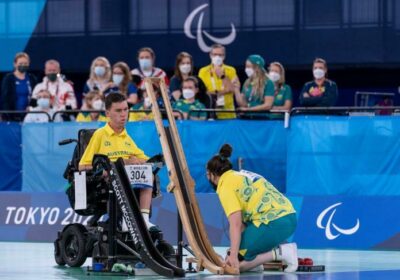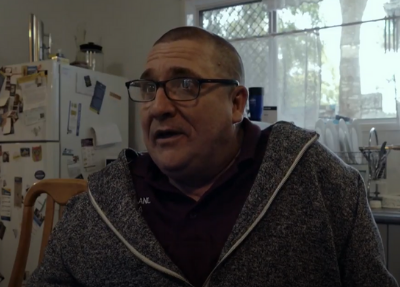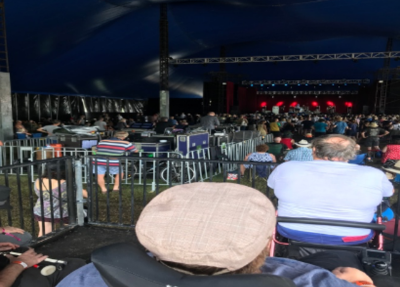The Loop's Guide to Recreation
Having a neuromuscular condition doesn’t mean you have to stay on the sidelines. Here are some ideas for getting involved in sports, leisure activities and the arts.
Recreation
Staying active and joining in with hobbies and activities you enjoy is good for both your physical and emotional health. It might take a bit of trial-and-error or finding new ways to do the things you love but you can still be involved in activities such as sport, recreation and the arts when you are living with a neuromuscular condition.
Sports
Playing sport can have many benefits, both physically and emotionally. Learning new skills, being part of a team, staying active, overcoming failures, conquering goals and celebrating wins go hand in hand with being involved in sport. Many sports and activities can be accessible, safe and fun for people with neuromuscular conditions. A great way to get started is to talk to your neuromuscular health care team for advice about the best types of sports for you to try. Go and watch some different sports being played as you might see something that really sparks your interest. Talk to the club and find out how you can get involved. There might be sessions for you to come and try before signing up, beginner’s teams or coaching available to help you learn the skills you need.
Here are some sports that might be suitable. This is not an exhaustive list, just a starting point. Depending on your condition, you might find other sports that work for you.
Boccia
What is boccia?
Boccia is a sport of control and accuracy, similar to lawn bowls. It can be played by anyone and is an easy sport for beginners to learn quickly. It builds in intensity and complexity as players develop their skills and players can go on to play at state, national and Paralympic levels.
The aim of the game is to throw leather balls as close as you can to a white target ball (jack). Competing in wheelchairs, you can throw, kick or even use a ramp to get the ball where you want it to go. Players who use a ramp are helped by a ‘ramp assistant’ who sits facing away from the court and positions the ramp according to the player’s instruction
Boccia can be played head to head with just two players, in teams of three, or in pairs.
What are the rules?
Boccia is played indoors, on a court that is similar in size to a badminton court. The court includes six throwing boxes, one for each athlete. Athletes must stay in their box during their turn.
Games last four or six ends. Each side has six balls (red or blue) per end to try and score points. The closest side to the target ball when all the balls have been played, scores. If the game is tied after all ends have been played, a tie-break end is played.
What equipment do I need?
There is very little equipment involved, just boccia balls and a ramp if needed.
What does it cost?
You may need to pay a small membership fee to join a boccia club. It is possible to access funding (including NDIS) to pay for equipment and support to get to games.
How do I get started?
Boccia Australia can direct you to boccia clubs in your state or territory.
Powerchair Football
What is powerchair football?
Powerchair football is a modified version of soccer for electric wheelchair users. There are two teams of four players (including the goalkeeper). The objective is to score more goals than the opposing team by using the foot guard on the powerchair to kick and block the ball.
What are the rules?
Powerchair football is played indoors on a standard-sized basketball court. The ball is an oversized soccer ball, 33cm in diameter. There are four players per team on court at one time, including the goalkeeper, and a match consists of two 20-minute periods.
What equipment do I need?
You need a powerchair (specialised electric wheelchair), lap belt, a foot guard and guard rails.
What does it cost?
As you become more involved in the sport, you may want to consider other options for your wheelchair guard, and it is possible to access funding (including NDIS) to pay for equipment and support to get to games. Usually, a membership fee will also apply.
How do I get started?
- Australian Powerchair Football Association
Contact: Martin Dalrymple – Secretary
Phone: 0419 294 705 - New South Wales: Football NSW
- Queensland: Queensland Powerchair Football Association
- Victoria: Victorian Electric Wheelchair Sports Association
- Western Australia: WA Powerchair Football Association
- Australian Capital Territory: Capital Football-Football Connect-Powerchair Football
- South Australia: Push and Power Sports Association
Rowing
Para-rowing is rowing for people with a disability and can be enjoyed by athletes of all ages. It is a fun activity that can be done individually or in teams.
What equipment do I need?
Depending on your condition, you may need to use modified equipment to make it safer and easier for you to row. This includes modified boats, floats to stabilise the boat, specialised seating and strapping for extra support.
What does it cost?
Usually, a membership fee will apply. It is possible to access funding (including NDIS) to pay for equipment and support to get to training and events.
How do I get started?
- Rowing Australia
P: (02) 6100 1115
E: gmarcks@rowingaustralia.com.au - Rowing NSW
P: (02) 9555 6111
www.rowingnsw.asn.au - Rowing Queensland
P: (07) 3842 1200
W: https://www.rowingqld.asn.au/home/ - Rowing Victoria
P: (03) 9645 0624
W: https://www.rowingvictoria.asn.au/home/ - Rowing ACT
P: 0406 376 666
W: https://rowingact.org.au/ - Rowing South Australia
P: (08) 8242 3288
W: https://rowingsa.asn.au/ - Rowing Tasmania
P: 0418 125 319
W: http://www.rowingtasmania.com.au/home/ - Rowing WA
P: (08) 9364 3905
W: https://www.rowingwa.asn.au/home/
Athletics
What is para-athletics?
Para-athletics includes both track and field events for people of all ages and abilities. Athletics is a great way to be active and meet other athletes in a fun atmosphere. Events that you can participate in include sprints, middle and long-distance races, javelin and other throwing events, high jump and long jump.
What equipment do I need?
Depending on your condition, you may need some equipment such as a wheelchair or modified sports equipment to help you participate.
What does it cost?
Usually a membership fee will apply. It is possible to access funding (including NDIS) to pay for equipment and support to get to games.
How do I get started?
Every state has a local athletics program and the Athletics Australia website can help you find a club in your area.
Cycling
What is cycling?
Cycling is an inclusive sport that can be accessed by people with many types of disability. Athletes race on bicycles, tricycles, tandem or handcycles (powered by the arms) depending on their condition and abilities. You can compete on a track or on the road.
What equipment do I need?
Depending on your condition, you may need a specialised or certain type of bicycle to help you participate. There are 4 types of bikes used in para-cycling:
1. Tandem bikes are used by athletes who are visually impaired.
2. Handcycles are used by people with significantly limited leg function
3. Tricycles are used by athletes who need more stability
4. Standard bikes, sometimes with some modifications to the handlebars or brakes
What does it cost?
Usually a membership fee will apply. It is possible to access funding (including NDIS) to pay for equipment and support to get to events.
How do I get started?
- Cycling Australia
Phone: (02) 9339 5800
Email: membership@cycling.org.au
Website: http://www.cycling.org.au/ - New South Wales
Para-cycling
Cycling NSW
Phone: (02) 9738 5850
Email nsw.cycling@cycling.org.au
Hand-cycling
Wheelchair Sports NSW
Phone: (02) 9809 5260
- Queensland
Cycling Queensland
Phone: (07) 3390 1477
Email: qld.info@cycling.org.au - South Australia
Cycling South Australia
Phone: (08) 8260 1800
Email: kimberley.conte@cycling.org.au - Victoria
Cycling Victoria
Phone: (03) 8480 3077
Email: vic.info@cycling.org.au - Western Australia
CycleSport Western Australia
Phone: (08) 6336 9680
Email: wa.info@cycling.org.au - Tasmania
Cycling TAS
Phone: (03) 6343 4343
Email: tas.info@cycling.org.au - Northern Territory
Cycling NT
Phone: 0428 523 684
Email: mandyjoyhargreaves@gmail.com - Australian Capital Territory
Cycling ACT
Phone: (02) 6230 5450
Email: act.info@cycling.org.au
Other modified or wheelchair sports
There are many other modified or wheelchair sports you can try, including hockey, rugby, Australian Rules, basketball, archery, shooting, swimming and many other activities. For more information contact your local neuromuscular organisation or:
National
Disability Sports Australia: info@sports.org.au
National Electric Wheelchair Sports
Disability Online: Australia’s Disability Hub
QLD
Sporting Wheelies and Disabled Association: Boccia, para-powerlifting, wheelchair basketball, wheelchair rugby, active recreation
SA
WA
Western Electric Sports Association: Powerchair football, powerchair hockey, power rugby
WA Disabled Sports Association
NSW
Victoria
Victorian Electric Wheelchair Sports Association: Powerchair hockey, powerchair football, powerchair rugby
Tasmania
Physical DisABILITY Sports Tasmania
Sailing
If you love being out on the water, sailing can be a great activity to try. Some sailing clubs offer the Sailability program for people of all abilities to get into sailing. Sailability provides extra support, an established network of volunteers, and equipment to assist those with limited mobility to get into and out of boats and access docking areas.
Each club offering a Sailability program has a Sailability Co-ordinator who is a point of contact for people who want to find out more. The Sailability Co-ordinator oversees a team of volunteers who are passionate about welcoming people of all-abilities to sailing. Contact your local club to find out if the Sailability program is available in your local area.
Horseriding
Horseriding can provide many social, physical and emotional benefits for people with neuromuscular conditions. Riding for the Disabled offers special programs for anyone with a disability to enjoy safe, therapeutic horse-related activities in each of the States and Territories across Australia.
Camps
Muscular Dystrophy NSW and Muscular Dystrophy WA offer camps for families affected by neuromuscular conditions. The camps are a chance for children with neuromuscular conditions to learn vital life skills, build courage, friendships and independence, and most importantly have fun. Contact your local neuromuscular office {link to state/territory page} for information about camps.
Duke of Edinburgh’s Award
The Duke of Edinburgh’s Award is a great way for young people with a neuromuscular condition to get involved with something different, learn new skills, get active and help out in their community. People aged between 14 and 25 years can participate in the internationally recognised program of non-competitive activities in four award sections:
- Volunteering: get involved in your community and give service to others.
- Skill: develop your skills in an academic, creative, practical or technical activity. You can do something you already love or learn something new.
- Physical recreation: take part in something active such as football, basketball, dancing, surfing or swimming.
- Adventurous Journey: discover a sense of adventure and do something challenging with your friends.
The Duke of Ed has three Award Levels – Gold, Silver and Bronze – and you design your own program around the things that interest you most. You'll have an Award Leader, instructors and assessors who can help you decide on activities for each Award section but remember, it's your choice.
When you successfully complete an Award level you will receive an internationally recognised certificate and badge.
To get involved, contact your local neuromuscular office. {link to state and territory offices}
Arts
Tapping into your creative side and getting involved in the arts can be great for your mental and physical health. Art can also help you build important life skills to participate more confidently in work, education and your community.
Whether your passion lies on the stage, backstage, in the gallery or in the audience, the arts can offer something for everyone, including:
- theatre
- performance, dance and video
- music
- painting and visual arts.
Where to find more information
Arts Access Australia (AAA) shares national and international opportunities and access to the arts for people with disability as artists, arts-workers, participants and audiences.
Disability Online: Australia’s Disability Hub has a fantastic directory of arts organisations in your local area.
NDIS
You can choose to have arts activities written into your NDIS plan {link to NDIS page}. While art and cultural participation are not mentioned directly in the NDIS, arts activities fall under the categories of social and community participation, skills development, pathways to employment, and health and wellbeing. Contact your local neuromuscular office for more information.
Have advice, 'how to' guides or a story you want to share? We want to hear from you!
You can submit your story or guide via our form. Provided your content meets our content requirements, your post will be published by a Loop moderator to the Living Life section.
Share your story


